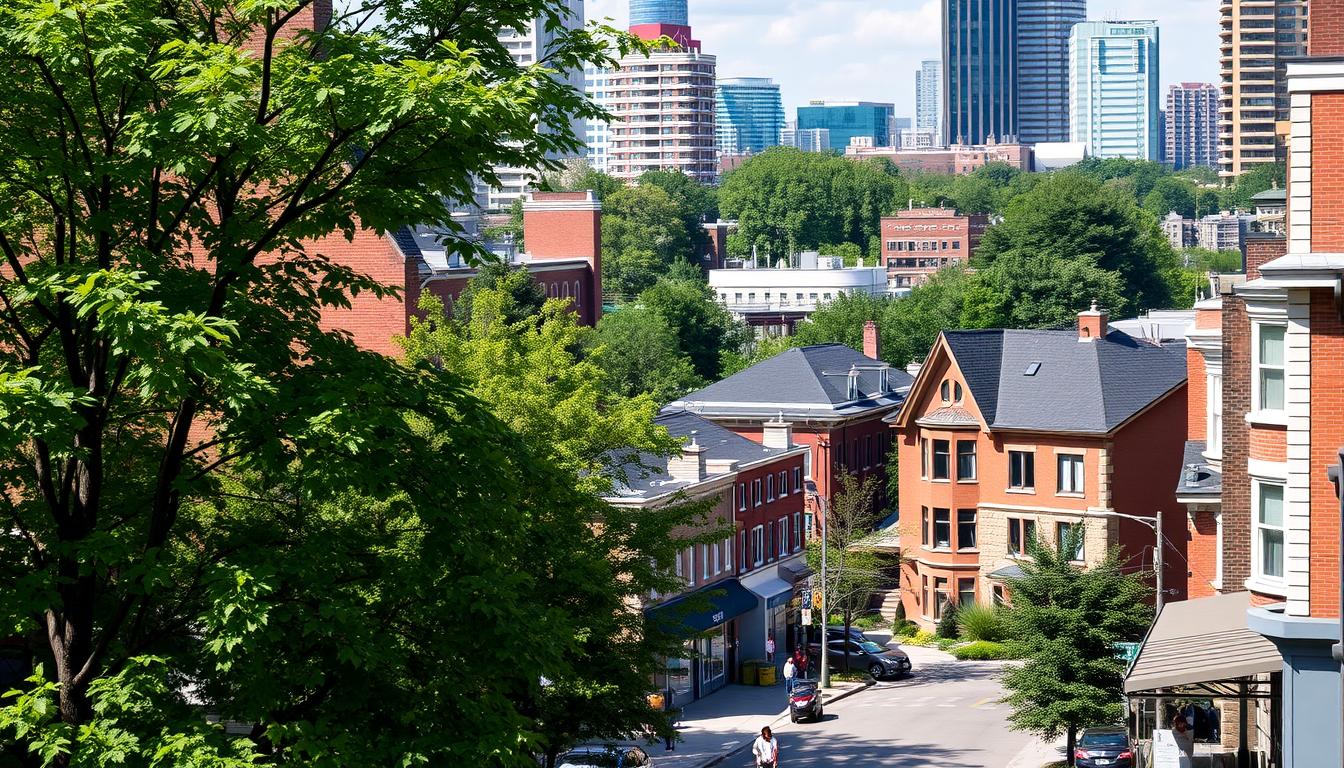Exploring the Toronto real estate market can seem overwhelming. But, with the right tools and advice, finding your dream home in the GTA is possible. This guide will walk you through the steps to find, finance, and secure your perfect property in Toronto by 2025.
The GTA housing market is always changing. Knowing the latest trends, prices, and neighbourhoods is key for homebuyers. We’ll cover the important details you need to make a smart choice in this fast-paced market.

Key Takeaways
- Comprehensive guide to navigating the Toronto real estate market in 2025
- Insights into current market trends, pricing, and key neighbourhoods
- Financial preparation and mortgage requirements for homebuyers
- Strategies for finding and securing your dream home in Toronto
- Understanding property types, zoning laws, and legal considerations
Understanding Toronto’s Real Estate Market Landscape
Toronto is Canada’s biggest city, and its real estate market is very popular. It’s important to know the current trends, key areas, and what’s expected in 2025.
Current Market Trends and Pricing Analysis
In recent years, Toronto’s housing market has seen a big increase in demand. This has led to higher prices for different types of homes. Detached homes now average over $1.2 million, while condos are around $700,000.
Key Neighbourhoods and Their Characteristics
Toronto has many neighbourhoods, each offering something different. Areas like Downtown, Midtown, and North York are very popular. Downtown is lively with lots of condos, while Midtown is great for families with a mix of homes.
Market Forecasts for 2025
Experts think Toronto’s real estate market will keep growing, but at a slower pace. They predict the average home price will hit $1.5 million by 2025. This is due to more people moving here, increased housing demand, and Toronto’s appeal to buyers.
| Neighbourhood | Average Home Price (2025 Forecast) | Key Characteristics |
| Downtown | $1.8 million | Vibrant urban core, high-rise condos, access to amenities |
| Midtown | $1.4 million | Family-friendly, mix of detached and semi-detached homes |
| North York | $1.3 million | Suburban feel, larger lots, proximity to green spaces |
Knowing the current trends, key areas, and future forecasts helps buyers in Toronto. It lets them make smart choices in the city’s lively real estate market.

Financial Preparation and Mortgage Requirements
Buying a home in Toronto needs careful financial planning. First, you must know the Toronto mortgage rates and local lending rules. This helps set your budget and find the right home loan.
The down payment rule in Ontario is at least 5% of the home’s price. A 20% down payment can lead to better home loan terms and avoid extra costs like mortgage default insurance.
Lenders will check your financial planning and credit score. A good credit history and stable income boost your mortgage pre-approval chances. This means you might get better rates.
| Mortgage Type | Current Average Rates in Toronto |
| 5-Year Fixed | 5.25% |
| Variable Rate | 4.75% |
| 10-Year Fixed | 5.75% |
Knowing the financial needs and preparing well will help you get your dream home in Toronto.

Finding Your Dream Home in Toronto: Where to Start
Starting your search for a home in Toronto’s competitive market can feel overwhelming. But, with the right approach, you can find your ideal home. Begin by using the knowledge of Toronto real estate agents and the power of property search websites.
Working with Real Estate Agents
Having a good relationship with a Toronto real estate agent is key. They offer insights into the local market, guide you through buying a home, and find properties that fit your needs. Choose an agent with experience in your area and a good track record.
Online Property Search Tools
Use property search websites to enhance your agent’s help. These sites offer detailed listings and advanced search options. They help you find homes quickly, filter by your criteria, and set up alerts for new listings. Knowing these tools can make your search easier.
Open House Strategies
Visiting open houses is a great way to see the market and homes up close. Prepare questions, observe the area, and note details not seen online. Open houses are also a chance to meet Toronto real estate agents and see properties.
By using local agents, online tools, and open houses, you can start your home search in Toronto. These steps will help you make a smart and confident choice.
The Home Buying Process in Ontario
Understanding Ontario real estate laws and home buying steps can seem tough. But knowing the property purchase process is key for a smooth home buying experience. Here, we’ll outline the main stages of buying a home in Toronto’s lively market.
- Property Search and Viewing: Start by looking at online listings and visiting open houses to find your ideal home. Work with a reliable real estate agent to find properties that fit your budget and preferences.
- Offer Submission and Negotiation: When you find the perfect property, it’s time to make an offer. Your agent will help you negotiate, ensuring your bid is strong while protecting your interests.
- Acceptance and Conditional Periods: If your offer is accepted, you’ll enter a conditional period. Here, you’ll need to meet several conditions, like getting financing, doing home inspections, and reviewing legal documents.
- Financing and Documentation: Get pre-approved for a mortgage and collect all needed paperwork. This includes proof of income, employment, and down payment sources.
- Closing and Title Transfer: The last step is the legal transfer of the property. You’ll sign documents and take possession of your new home.
Remember, understanding Ontario real estate laws and home buying steps takes patience and detail. Knowing the property purchase process helps you make smart choices. This way, you can achieve your dream of homeownership in Toronto’s exciting real estate market.
Understanding Property Types and Zoning Laws
Exploring the Toronto property market means knowing about different homes and zoning rules. Each home type, from grand detached houses to cozy condos, has its own features and rules.
Detached vs. Semi-Detached Properties
Detached homes in Toronto offer privacy and lots of space. They sit alone on their lots, without shared walls. This makes them popular but pricey. Semi-detached homes, however, share a wall but are more affordable.
Condos and Townhouses
Looking for an easy lifestyle? Toronto’s condos and townhouses are great options. Condos have shared spaces and are easy to leave. Townhouses offer a single-family home feel but are smaller.
Building Codes and Regulations
- Toronto’s zoning regulations control what you can build and how.
- The Ontario Building Code sets rules for building and renovating homes.
- Homeowners must follow these building codes and regulations for their properties.
Knowing Toronto’s property scene and its rules is key to finding your dream home. Learning about the options and rules helps you make smart choices and move through the market with ease.
Down Payment Options and Government Incentives
Buying a home in Toronto can seem tough, but it’s achievable with the right help. Knowing your down payment options and government incentives is key. This is especially true for first-time buyers.
In Ontario, you need at least 5% of the home’s price for a down payment. But in Toronto’s competitive market, a bigger down payment can help. You can save more by using a Tax-Free Savings Account (TFSA), tapping into your Registered Retirement Savings Plan (RRSP), or looking into Toronto home buyer incentives and down payment assistance programs.
Government Incentives for Toronto Home Buyers
- First-Time Home Buyer’s Tax Credit: A federal tax credit worth up to $5,000 for eligible first-time homebuyers.
- Land Transfer Tax Rebate: Ontario provides a rebate of up to $4,000 on the land transfer tax for first-time home buyers.
- Home Buyers’ Plan: A program that allows you to withdraw up to $35,000 from your RRSP to put towards a down payment, with the option to repay the funds over time.
- Toronto Home Ownership Assistance Program (HOAP): A City of Toronto initiative that provides down payment assistance loans to eligible first-time buyer programs.
By using these Toronto home buyer incentives and exploring your down payment options, you can move closer to owning your dream home in this vibrant city.
Home Inspection and Property Assessment
Buying a home in Toronto is a big deal. It’s important to do thorough Toronto home inspections before you buy. Knowing what to look for and spotting red flags can help you understand the property’s value and condition.
What to Look For During Inspections
When you do a house inspection checklist, check the structure, plumbing, and electrical systems. Look for water damage, insulation, roof age, and the home’s overall state. This includes the exterior and interior.
Common Red Flags
- Presence of mold or water damage
- Outdated or faulty electrical wiring
- Structural issues, such as cracks in the foundation or sagging floors
- Outdated or malfunctioning HVAC systems
- Roof in need of replacement or repair
Professional Assessment Services
While a property assessment is helpful, get a professional home inspector for a detailed check. They can spot problems and give you a fair view of the home’s state. This helps you decide if the home is right for you.
| Service | Description | Average Cost (GTA) |
| Home Inspection | A comprehensive evaluation of the property’s condition | $400 – $600 |
| Structural Assessment | Focused inspection of the home’s structural integrity | $300 – $500 |
| Environmental Assessment | Evaluation of potential environmental hazards, such as mold or radon | $200 – $400 |
Understanding Toronto home inspections and using professional services helps you make a smart choice. You’ll be confident in your decision about your future home in the Greater Toronto Area.
Legal Considerations and Documentation
Buying a property in Toronto means you must understand the legal side. Toronto real estate lawyers help make the process smooth and safe. They guide you through all the needed documents and the title search.
The first step is a detailed title search. Lawyers in Toronto check the property’s history. They make sure who owns it, if there are any debts, and if there are any claims. This step is key to knowing the property’s legal state and spotting any problems early.
Next, you need to look at property legal documents like the purchase agreement, deed, and mortgage papers. Toronto real estate lawyers make sure these are right, legal, and protect your rights as a buyer.
- Understand the purchase agreement and its terms and conditions
- Review the deed to confirm the property’s legal ownership
- Examine mortgage documents to ensure favorable terms and conditions
Toronto real estate lawyers do more than just check documents. They also offer advice on the legal side of buying a home. This includes things like zoning laws, property taxes, and any legal problems that might come up.
| Legal Consideration | Importance |
| Title Search | Verifies property ownership and identifies any encumbrances or claims |
| Property Legal Documents | Ensures the purchase agreement, deed, and mortgage documents are accurate and legally binding |
| Legal Advice | Provides guidance on navigating zoning regulations, property taxes, and other legal aspects |
With the help of Toronto real estate lawyers, your home purchase in the city will be legal and safe. This protects your investment for a long time.
Negotiation Strategies in Toronto’s Market
Getting through Toronto’s real estate market needs smart negotiation skills. Whether you’re making a competitive offer or dealing with a counter-offer, knowing the right tactics is key.
Making Competitive Offers
In Toronto’s Toronto real estate negotiations, finding the right balance is crucial. Research similar homes and be ready to act fast. Adding attractive terms, like a flexible closing date, can make your offer stand out.
Understanding Counter-Offers
When a seller makes a counter-offer, stay calm and think it through. Check the new terms and see if they fit your budget. Negotiate politely but firmly, and be ready to walk away if it’s not right for you.
Closing Deal Tactics
In the final stages of competitive bidding, build a good relationship with the seller and their agent. Be quick to respond, open, and willing to compromise. Keep everything organized and be ready to act fast to get your dream home in Toronto.
| Negotiation Strategy | Key Considerations | Potential Benefits |
| Making Competitive Offers | Research market valueAct quicklyInclude attractive terms | Stand out in a crowded marketSecure your desired propertyDemonstrate your seriousness as a buyer |
| Understanding Counter-Offers | Review terms carefullyAssess your budgetNegotiate politely | Reach a mutually agreeable compromiseMaintain a positive relationship with the sellerSecure the property within your financial means |
| Closing Deal Tactics | Build rapport with seller and agentEnsure all paperwork is in orderAct quickly when opportunity arises | Smooth and successful transactionIncrease your chances of securing the propertyEstablish a positive relationship for future real estate opportunities |
Mastering these Toronto real estate negotiations strategies will help you navigate Toronto’s housing market. You’ll be ready to find your dream home.
Moving and Settlement Planning
Moving to a new home in Toronto is exciting but can feel overwhelming. Planning and organizing are crucial for a smooth move. This guide will help you with everything from finding reliable Toronto moving services to changing your address.
Hiring Moving Professionals
Finding a good moving company is a key first step. Look for Toronto-based movers and compare their prices, reviews, and services. A professional team will take care of the heavy work, letting you focus on other important tasks.
Change of Address Procedures
- Let your current utility providers know you’re moving and give them your new address.
- Change your mailing address with the post office so your mail goes to your new home.
- Tell your bank, credit card companies, and other financial places about your address change.
- Update your driver’s license and vehicle registration with the Ontario Ministry of Transportation.
Settling into Your New Home
- Get to know your new neighbourhood, including where to shop and get prescriptions.
- Meet your neighbours and check out local events to connect with your community.
- Unpack and organize your stuff to make your new dream home in Toronto feel like home.
By following these steps, you’ll have a successful and easy Toronto moving services experience. You’ll be ready to settle into your new home and community without stress.
Property Insurance and Maintenance
As a homeowner in Toronto, it’s key to protect your investment with the right insurance. Home insurance and liability protection are essential. Reviewing your policy yearly is wise to keep it up-to-date with your property’s value and any changes.
Insurance Requirements
Homeowners in Toronto must have home insurance. It covers damage to your home, belongings, and liability if someone gets hurt. Premiums vary based on your home’s value and location. It’s smart to shop around for the best coverage at a good price.
Seasonal Maintenance Tips
Keeping your Toronto home in good shape is vital. In spring, clean gutters, check the roof, and ensure good drainage. In winter, remove snow, watch for ice dams, and insulate pipes to prevent bursts.
Regular landscaping, HVAC checks, and pest control also help your home last longer.
Budget Planning for Upkeep
Homeownership in Toronto means ongoing maintenance costs. Set aside money for regular tasks and unexpected repairs. Experts suggest saving 1-2% of your home’s value each year for upkeep. This way, your Toronto home stays in great shape for years.
FAQ
What are the current market trends and pricing analysis in Toronto’s real estate market?
Toronto’s real estate market has grown a lot lately. Prices keep going up in different areas. There’s a big demand for homes, but there aren’t enough to go around.
This makes the market very competitive. The average home price has hit new highs. This makes it hard for many to afford homes.
What are the essential financial considerations when preparing to buy a home in Toronto?
To buy a home in Toronto, getting pre-approved for a mortgage is key. You need to know the current mortgage rates. Also, figure out how much you can afford to put down.
Check your credit score and how much debt you have. This helps ensure you meet the market’s lending standards.
How can I efficiently search for and find my dream home in Toronto?
Working with a good real estate agent is crucial in Toronto. They know the market well and can guide you. Use online tools and go to open houses to find homes that fit your needs and budget.
What are the legal considerations and documentation required when buying a home in Ontario?
Buying a home in Ontario involves legal steps. You need to do a title search and check zoning and building codes. A real estate lawyer must oversee the deal.
Know the documents you need, like the purchase agreement and land transfer tax forms. This ensures a smooth purchase.
How can I negotiate effectively in Toronto’s competitive real estate market?
Negotiating in Toronto’s market needs a smart plan. Make strong offers and understand counter-offers. Work with your agent to develop a strategy that fits your budget and goals.
What are the key considerations for property types and zoning laws in Toronto?
Toronto has many property types, like detached homes and condos. Each has its own needs and rules. Knowing these helps you choose the right home for you.
What government incentives and down payment options are available for homebuyers in Toronto?
The Canadian and Ontario governments help homebuyers in Toronto. They offer down payment help, tax credits, and special mortgages. These options can make buying a home easier and less expensive.
How can I ensure a thorough home inspection and property assessment in Toronto?
A detailed home inspection is vital in Toronto. Look for any problems, like structural issues or electrical concerns. A professional inspector can give you important insights to help you decide.
What should I consider when planning the move and settlement process in Toronto?
Moving to a new home in Toronto needs careful planning. Hire good moving services and update your address. Also, plan for extra costs like setting up utilities and buying new furniture.
What are the essential property insurance and maintenance requirements for homeowners in Toronto?
Toronto homeowners need the right insurance to protect their property. Regular maintenance keeps your home in good shape. Understand your insurance needs and budget for upkeep to care for your home long-term.
Your Trusted Real Estate Agent in Toronto
Looking for expert assistance to buy or sell your property in Toronto? Contact us today to work with a professional real estate agent who knows the market inside and out!
Get in TouchBusiness Contact Details
- Address: 305 Milner Ave Unit # 312, Toronto, ON M1B 3V4, Canada. Get Direction - Google Map
- Contact Name: Sivage Sivagumaran
- Phone: +1 416-553-8902
- Email: sivagehomes@sivage.ca
Visit our website at SivageRealty.ca for the latest property listings and personalized services. Let us help you turn your real estate goals into reality. Your dream property is just a call away!
Disclaimer:
The content provided in this blog is for informational purposes only. We recommend consulting with a qualified professional before making any decisions based on the information provided. If you have any questions or concerns, please don't hesitate to reach out to us. Our contact information is available on the Contact page.




